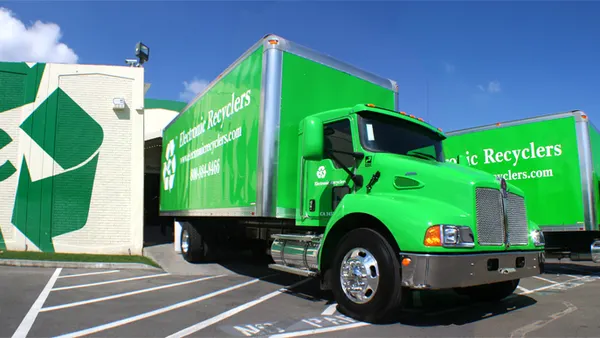UPDATE Dec. 14, 2017: Portsmouth, VA City Manager Lydia Pettis Patton said at a city council work session she expects to resume contracting with Recycling & Disposal Solutions of Virginia (RDS) by Dec. 22, as reported by The Virginian-Pilot.
The city began sending glass, plastic and paper material to a Wheelabrator waste-to-energy facility, without informing residents, last month. The city requested bids from recycling service providers in August after RDS decided not to renew its existing contract.
Pettis Patton told council members she expects that RDS will have a final contract to review and sign by the end of the week.
Dive Brief:
- Unbeknownst to residents, Portsmouth, VA has been sending all of its curbside recyclables to a Wheelabrator waste-to-energy facility since Nov. 4, as reported by The Virginian-Pilot.
- Recycling & Disposal Solutions (RDS), the previous recycling processor, notified the city in August that it was no longer interested in pursuing a new contract. RDS cited difficult markets and low profitability as the main reason, as reported by WAVY.
- Bids were due in September and the city is currently reviewing them. Local officials have pushed back on criticism about material not being recycled by saying that at least it's getting turned into energy as opposed to buried in a landfill. As for the fact that residents are still taking the time to sort their material at the curb, Mayor John Rowe said that was "no extra work at all."
Dive Insight:
This Wheelabrator site, which provides energy for the region and steam for the Norfolk Naval Shipyard, is once again seen as the predominant local facility of its kind after previous plans for a WTE project from RePower South lost support over the summer. Following concerns about the project's viability, the Southeastern Public Service Authority Board recently voted to extend its contract with Wheelabrator through the start of 2019. Due to various financing factors, the cost to tip material at that facility has decreased, while recycling markets are experiencing greater challenges.
At the state level, Virginia's Department of Environmental Quality hasn't been hearing feedback about market challenges. At the local level, like in many parts of the country, it's clear that issues are developing. More will be known about the financial conditions of recycling in Portsmouth once bid details become public and the city moves forward with a selection.
In the meantime, confidence in the recycling system among Portsmouth residents may need further attention. As seen recently in Fort Smith, AR, where recyclables were going to a landfill without public notice, residents can quickly become angry if they feel left in the dark. In other cases, such as in Honolulu, officials have been considering whether it's more beneficial to send material to WTE. Depending on unique local factors, and the strength of recycling markets, that conversation may be a necessary one. Though in Honolulu that decision will not be made lightly and consumer communication is seen as a top priority.










